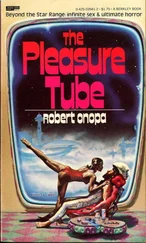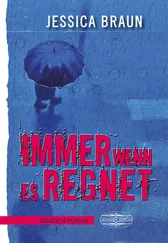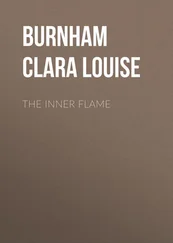But I’m a grownup now, selfish. Prove it? Sitting cross-legged on this cold gray floor, I challenge myself to remember the store credited with supplying George Burns’s wardrobe on The George Burns and Grade Allen Show. Rappaport’s? Bienstock’s? Tavelman’s. There you are. With the miraculous adult mind, I can put myself inside there, ca. 1956. Mr. Lou, the tallis-like measuring tape around his neck, offers a hamantasch and weak coffee. He displays bolts of cloth, leads the ritual fingering. “Let us fit you special for a nice herringbone two-button.” I feel languid, serene, with no urge to buy. Radio comes softly from the front of the store. The Polynesian Hour. As Mr. Lou takes my inseam, I feel I could stand here forever.
HE WAS WEARING AN agate bolo tie and blue coveralls and he was in my room when I came back from a double shift at the facility.
“Afternoon, brother.”
He seemed quite comfortable in my director’s chair, feet propped on the round white table. He pointed with his chin at a Conestoga wagon making its way slowly from right to left across the color console screen.
“Clear as a mountain lake, eh?”
“Do we know each other?”
Needlenose pliers snapped back and forth at me. He ventriloquized: “Frank Goodhue, television doctor with the zeal to heal.”
I clicked off the set and turned on the air conditioner.
“Mr. O. has me in several times a year and I give everyone a checkup.”
I noticed a plastic bag of brownies under the bedside lamp. Heidi. I felt new fatigue.
“You ought to stretch out,” Goodhue said, reaching into his tool bag for a stick of gum. “Just disposed of a body, from the look of you.”
How the world’s wise guys plagued me. I threw the brownies at him. “Have all you want.”
He smiled, rolled up his gum like a prayer rug before crushing it in his molars. “Really. Take a load off.”
I undid buttons, closed my eyes. The refrigerated air felt nice and heavy. Goodhue’s voice was quick and thin and straw-dry as he told the old story no one ever asked to hear. Eleven years in the monastery hard by Lake Huron, dipping candles and making cheese. Dreadful winters, ice in the washbasin and carillon bells cracking the air. The abbot who sang to his cat, who was exposed in a national magazine as a war criminal, an officer in the Iron Guard. And finally surreptitious correspondence courses, a determination to get out and do something useful.
“Learning to make decisions again was no picnic, I’ll tell you for sure.”
I pictured Heidi smoothing the sheets, thin babydoll hair hiding her face. My limbs buzzed with imminent sleep. This TV doctor was better than a lullaby
“And after that?” I murmured.
“Hired on with a high-volume appliance store in Grand Rapids. Very first house call I went on, the husband had blown out their picture tube with a deer rifle.”
The facts of his life passed over me like gas. Marriage to a grocery checker, disintegration and aimless flight. Drinking bouts and the stink of charred tubes, the sharp intimacies of uncounted dens and rec rooms where anxious clients waited out the restoration of their sets.
“You’d be amazed at the amount of gratitude…”
Goodhue was gone when I woke up. Dim, agitated light in the black room — TV back on — and there was the brownie bag rising and falling on my chest. Heidi would be calling soon, wanting to be teased. I unhooked the phone, wedged open the door so warm night haze could come inside. Cars went by too fast, radios harsh and windshields splattered with moths. I had brownies and root beer, watched a documentary on Islamic architecture, and had to admit the picture was as clear and clean as a picture could be.
He’s wearing a nylon workout suit and eating a taco over my desk.
“You weren’t expecting me?”
He seems quite comfortable with my signaled annoyance. The frames of his glasses are of thick lime-green plastic; the embossed card he passes to me is creamy and thin.
KEVIN LUIS DUKES
SENIOR RESEARCH FELLOW
THE CENTER FOR POPULAR CULTURE AT BOWLING GREEN
He swivels in my chair as I read and reread, brushes shredded lettuce onto the floor.
“No, I’m not expecting you.”
“And I was hoping to start right in.”
“Okay. Why don’t you start with what you’re expecting.”
His soft, ballroom dancer’s face becomes more credible as it pinches down. Strumming a rubber band stretched between thumb and ring finger, he describes in some detail the assistance promised him in certain investigations necessary to the completion of a book. No outsider gets that kind of access, I think. Not without a reason.
“Who is it you know?”
He mentions the operations director of another department, someone with a reputation for malicious mischief.
“I married her only daughter,” he says blandly.
“Nice going.”
But, of course, he’d rather talk about his book.
“There’s an essay on professional wrestling, and another on the evolution of outdoor advertising. I’ve done a long piece examining the semiotics of Japanese pornography, and a reappraisal of Sammy Davis, Jr., called ‘The One-Eyed Man Is King,’ and…”
We move briskly down a long corridor carpeted with plastic grass. I nod and shift my eyebrows as though listening, while his voice blends with piped music and the sighing ventilators. I’m replaying this morning’s phone call to Ellen, who has now exhausted her allotment of emotional leave days.
“I ran out of food over the weekend,” she says from the bedroom of her company apartment. “So I drink lots of tea and chew toothpicks.”
“But you’re all right? I mean…”
“Me and my memory.” She coughs, moves inside rustling sheets. “Crazy what you file away. Little ordinary things that keep clicking into place, out of my control for certain. Probably I belong in a nursing home. Among my souvenirs.”
Never have I heard her voice quite this way. I’m uneasy, wanting her sullen and strong.
“What I can’t get through is why you choose the different bits. Can you sense it maybe? Catching one moment from a sideways kind of angle and there’s an essence that…”
“Unfuckingreal,” K. L. Dukes blurts out.
I’ve taken him into the South Monitor Wing. He seems genuinely impressed by the long wall of screens, the long motionless line of headphoned workers, the galaxy of control buttons.
“Looks like the war room.”
“Someday might be.” And I direct him to the data belt streaking green overhead, runic as a stock ticker.
He wipes his glasses in slow, diminishing circles, and reads:
“BMANILA 20/05 F1 MODE.”
“There’s a political address in five minutes on Philippine state TV.”
“How much do they pay for doing this?”
“Not enough.”
We tube down to the deepest level of hexagonal stacks and I take him through a few of the basics. How to run different searches, excerpting protocol, like that. He rattles his fingers back and forth across black container spines, looking undecided. The face is pinched again, the eyes suspicious. He grabs a tape at random, the 1978 Rose Bowl Parade, and examines it thoroughly, touching every part as if expecting a secret message in braille. Likably, his rhetorical smile is gone. I smell the salsa cruda on his breath.
“It’s insidious,” he says. “Like cancer cells proliferating.”
“You could look at it that way.”
“But you can’t, I suppose.” His expression is half sour, half amused. “One analogy too many.”
“I’ve been at it so long I’m immune.”
Fine and dandy, you’d think, with his beige GUEST badge and his connections-in-law. Whatever’s bothering the boy, it’s no research topic. Anyway, my nose is clean; I’m cooperating. We ascend two levels and I show him catalogs, decipher some of the categorization codes. He feigns interest incompetently, his eyes tracking the movements of everyone else in the room in apparent expectation of seeing someone he knows. Hoping to see them before they see him?
Читать дальше












